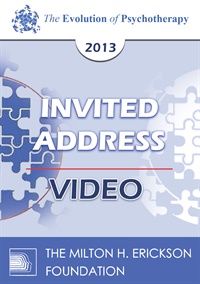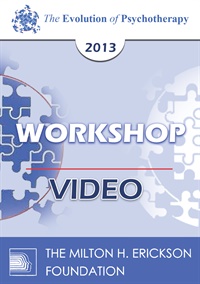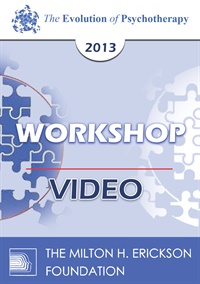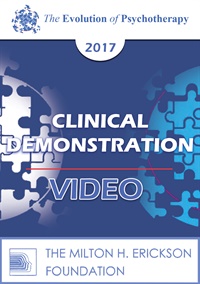- Average Rating:
- Not yet rated
- Topic Areas:
- Relationships | Invited Addresses | Psychotherapy | Self-Esteem
- Categories:
- Evolution of Psychotherapy | Evolution of Psychotherapy 2013
- Faculty:
- Harriet Lerner, PhD
- Course Levels:
- Master Degree or Higher in Health-Related Field
- Duration:
- 1:01:00
- Format:
- Audio and Video
- Original Program Date:
- Dec 13, 2013
- Short Description:
- All growth takes place in relationships, which either enhance maturity, zest and self-regard or diminish these possibilities. Lerner will present the seven key steps that one person can take to dramatically alter the course of unhappy or downward spiraling relationships, with an eye toward helping clients restore self-esteem, accountability, personal clarity, and growth-fostering interactions.
- Price:
-
Sale is $29.00
price reduced from Base Price - $59.00
- Average Rating:
- Not yet rated
- Topic Areas:
- Workshops | Couples Therapy | Emotionally Focused Therapy (EFT) | Psychotherapy | Relationships
- Categories:
- Evolution of Psychotherapy | Evolution of Psychotherapy 2013
- Faculty:
- Sue Johnson, EdD
- Course Levels:
- Master Degree or Higher in Health-Related Field
- Duration:
- 2:28:09
- Format:
- Audio and Video
- Original Program Date:
- Dec 11, 2013
- Short Description:
- EP13 Workshop 07 – Necessary and Sufficient: The Key Elements of Lasting Change in Couple Therapy – Sue Johnson, EdD
- Price:
-
Sale is $29.00
price reduced from Base Price - $59.00
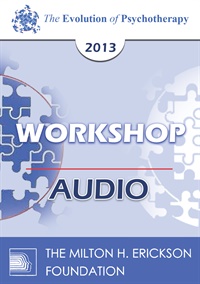
- Average Rating:
- Not yet rated
- Topic Areas:
- Couples Therapy | Workshops | Psychotherapy | Relationships
- Categories:
- Evolution of Psychotherapy | Evolution of Psychotherapy 2013
- Faculty:
- Michele Weiner-Davis, LCSW
- Duration:
- 2 Hours 11 Minutes
- Format:
- Audio Only
- Original Program Date:
- Dec 12, 2013
- Short Description:
- That only one partner is willing to seek relationship therapy should not deter therapists, since there is much that can be accomplished. In fact, there are occasions when working with only one partner is preferable. This workshop will explore these situations and offer therapists a conceptual framework for conducting relationship-oriented sessions with one partner present.
- Price:
- $15.00 - Base Price
- Average Rating:
- Not yet rated
- Topic Areas:
- Workshops | Feedback Informed Treatment (FIT) | Relationships | Tailoring | Therapeutic Relationship | Therapist Development
- Categories:
- Evolution of Psychotherapy | Evolution of Psychotherapy 2013
- Faculty:
- Scott Miller, PhD
- Course Levels:
- Master Degree or Higher in Health-Related Field
- Duration:
- 1:11:21
- Format:
- Audio and Video
- Original Program Date:
- Dec 15, 2013
- Short Description:
- It’s not a pretty picture. Available evidence indicates that the effectiveness of psychotherapy has not improved in spite of 100 years of theorizing and research. What would help? Not learning a new model of therapy. And no, not attending another CEU event or sorting through that stack of research journals by your desk. A simple, valid, and reliable alternative exists for maximizing the effectiveness and efficiency of treatment based on using ongoing client feedback to empirically tailor services to the individual client’s needs and characteristics. The Substance Abuse and Mental Health Services Administration recently deemed feedback informed treatment (FIT) an evidence-based practice.
- Price:
-
Sale is $29.00
price reduced from Base Price - $59.00
Credit available - Click Here for more information
- Average Rating:
- Not yet rated
- Topic Areas:
- Clinical Demonstrations | Couples Therapy | Psychotherapy | Relationships
- Bundle(s):
- EP17 Video Stream Build a Bundle
- Categories:
- Evolution of Psychotherapy | Evolution of Psychotherapy 2017 | Online Continuing Education
- Faculty:
- Harville Hendrix, PhD | Helen LaKelly Hunt, PhD
- Course Levels:
- Master Degree or Higher in Health-Related Field
- Duration:
- 1:02:47
- Format:
- Audio and Video
- Original Program Date:
- Dec 15, 2017
- Short Description:
- Chronic frustrations in adult significant relationships that are attended with intense negative emotions are rooted in unmet childhood needs. Identifying these needs helps partners become empathic with each other and also understand their own obsessive behavior. This demonstration will show clinicians how to identify early caretaker patterns, the unmet needs that result from them, the defense patterns used to cope with them and a process that will help address these needs as they show up in everyday life.
- Price:
- $0.00 - $29.00
Credit available - Click Here for more information
- Average Rating:
- Not yet rated
- Topic Areas:
- Clinical Demonstrations | Couples Therapy | Intimacy | Sex and Sexuality | Relationships
- Bundle(s):
- EP17 Video Stream Build a Bundle | Learning Track - Couples Starter Kit
- Categories:
- Evolution of Psychotherapy | Evolution of Psychotherapy 2017 | Online Continuing Education
- Faculty:
- Esther Perel, MA, LMFT
- Course Levels:
- Master Degree or Higher in Health-Related Field
- Duration:
- 52 Minutes
- Format:
- Audio and Video
- Original Program Date:
- Dec 16, 2017
- Short Description:
- Through podcasts and experiential exercises we will demonstrate clinical work around sexuality and intimacy with couples. Educational Objectives: Identify common blocks to eroticism including the fear of abandonment or entrapment, as well as how our emotional history shapes our erotic blueprint. Describe three strategies to help couples cultivate eroticism and bring a greater sense of aliveness to their relationship.
- Price:
-
Sale is $29.00
price reduced from Base Price - $59.00
Credit available - Click Here for more information
- Average Rating:
- Not yet rated
- Topic Areas:
- Clinical Demonstrations with Discussant | Gestalt | Somatic Experiences | Psychotherapy | Relationships | Therapeutic Relationship
- Bundle(s):
- EP17 Video Stream Build a Bundle | Learning Track - EP17 Gestalt Stream
- Categories:
- Evolution of Psychotherapy | Evolution of Psychotherapy 2017 | Evolution of Psychotherapy Psychotherapy Learning Track | Online Continuing Education
- Faculty:
- Erving Polster, PhD | Peter Levine, PhD
- Course Levels:
- Master Degree or Higher in Health-Related Field
- Duration:
- 1:25:10
- Format:
- Audio and Video
- Original Program Date:
- Dec 14, 2017
- Short Description:
- Personal disturbance is accompanied by feelings of disconnection within one’s self and with others. Reconnection is accomplished when the therapist guides the patient into a fertile conversational stream - a moment to moment impetus toward personal resolution.
- Price:
-
Sale is $29.00
price reduced from Base Price - $59.00
Credit available - Click Here for more information
- Average Rating:
- Not yet rated
- Topic Areas:
- Clinical Demonstrations with Discussant | Neuro-Linguistic Programming (NLP) | Psychotherapy | Relationships | Therapist Development
- Bundle(s):
- EP17 Video Stream Build a Bundle | Learning Track - EP17 Erickson Stream
- Categories:
- Evolution of Psychotherapy | Evolution of Psychotherapy 2017 | Evolution of Psychotherapy Erickson Learning Track | Online Continuing Education
- Faculty:
- Robert Dilts, BA | Michael Yapko, PhD
- Course Levels:
- Master Degree or Higher in Health-Related Field
- Duration:
- 1:24:12
- Format:
- Audio and Video
- Original Program Date:
- Dec 14, 2017
- Short Description:
- Based on the meticulous work of Ivan Pavlov, the Foreground-Background process involves using the "foreground" and "background" of perception with respect to a problem situation and a resource experience to create a quick and seemingly “magical” change. Usually, what is foregrounded in the experience of a problem or resource is quite different. The background of the two experiences, however, often shares many features which can be used to create bridge to resourceful experiences, leading to a transformation of the problem experience that is gentle, unconscious and effortless.
- Price:
-
Sale is $29.00
price reduced from Base Price - $59.00
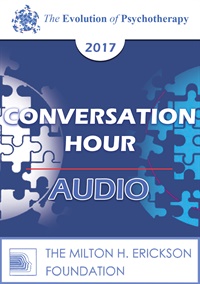
- Average Rating:
- Not yet rated
- Topic Areas:
- Conversation Hours | Couples Therapy | Conflict | Existential Therapy | Psychotherapy | Relationships | Intimacy
- Bundle(s):
- EP17 Audio Streaming Build a Bundle
- Categories:
- Evolution of Psychotherapy | Evolution of Psychotherapy 2017
- Faculty:
- John Gottman, PhD | Julie Gottman, PhD
- Course Levels:
- Master Degree or Higher in Health-Related Field
- Duration:
- 1:03:04
- Format:
- Audio Only
- Original Program Date:
- Dec 15, 2017
- Short Description:
- EP17 Conversation Hour 05 - John Gottman, PhD and Julie Gottman, PhD Educational Objectives: Describe why not all relationship conflict is the same, and why some conflicts require the therapist to be an existential psychologist. Describe why it is so vital for therapists to measure physiology in couples’ therapy. Describe what Gottman sound relationship house theory and Gottman method couples therapy offers in the following domains: (1) friendship and intimacy, (2) conflict management, (3) shared meaning, (4) trust, and (5) commitment.
- Price:
- $15.00 - Base Price

- Average Rating:
- Not yet rated
- Topic Areas:
- Great Debates | Transpersonal | Psychotherapy | Relationships | Therapeutic Relationship
- Bundle(s):
- EP17 Audio Streaming Build a Bundle
- Categories:
- Evolution of Psychotherapy | Evolution of Psychotherapy 2017
- Faculty:
- Jean Houston, PhD | Erving Polster, PhD
- Duration:
- 1:27:19
- Format:
- Audio Only
- Original Program Date:
- Dec 14, 2017
- Short Description:
- There is a professionally familiar dichotomy between the experience of an actual person to person relationship, on the one hand, and the transpersonal expansion. The latter is often given a special place in the therapeutic repertoire but, in actuality, they are overlapping experiences, Drs. Houston and Polster will each tell how these perspectives enter into their work, with an accompanying discussion.
- Price:
- $15.00 - Base Price
Please wait ...


